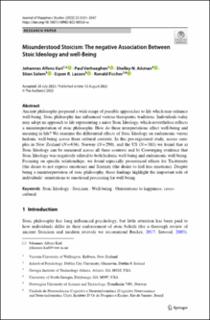| dc.contributor.author | Karl, Johannes Alfons | |
| dc.contributor.author | Verhaeghen, Paul | |
| dc.contributor.author | Aikman, Shelley N. | |
| dc.contributor.author | Solem, Stian | |
| dc.contributor.author | Lassen, Espen Rasmussen | |
| dc.contributor.author | Fischer, Ronald | |
| dc.date.accessioned | 2023-04-24T07:48:50Z | |
| dc.date.available | 2023-04-24T07:48:50Z | |
| dc.date.created | 2022-10-27T19:00:33Z | |
| dc.date.issued | 2022 | |
| dc.identifier.citation | Journal of Happiness Studies. 2022, 23 (7), 3531-3547. | en_US |
| dc.identifier.issn | 1389-4978 | |
| dc.identifier.uri | https://hdl.handle.net/11250/3064396 | |
| dc.description.abstract | Ancient philosophy proposed a wide range of possible approaches to life which may enhance well-being. Stoic philosophy has influenced various therapeutic traditions. Individuals today may adopt an approach to life representing a naive Stoic Ideology, which nevertheless reflects a misinterpretation of stoic philosophy. How do these interpretations affect well-being and meaning in life? We examine the differential effects of Stoic Ideology on eudaimonic versus hedonic well-being across three cultural contexts. In this pre-registered study, across samples in New Zealand (N = 636), Norway (N = 290), and the US (N = 381) we found that a) Stoic Ideology can be measured across all three contexts and b) Converging evidence that Stoic Ideology was negatively related to both hedonic well-being and eudaimonic well-being. Focusing on specific relationships, we found especially pronounced effects for Taciturnity (the desire to not express emotions) and Serenity (the desire to feel less emotions). Despite being a misinterpretation of stoic philosophy, these findings highlight the important role of individuals’ orientations to emotional processing for well-being. | en_US |
| dc.language.iso | eng | en_US |
| dc.publisher | Springer Nature | en_US |
| dc.rights | Navngivelse 4.0 Internasjonal | * |
| dc.rights.uri | http://creativecommons.org/licenses/by/4.0/deed.no | * |
| dc.title | Misunderstood Stoicism: The negative Association Between Stoic Ideology and well-Being | en_US |
| dc.title.alternative | Misunderstood Stoicism: The negative Association Between Stoic Ideology and well-Being | en_US |
| dc.type | Peer reviewed | en_US |
| dc.type | Journal article | en_US |
| dc.description.version | publishedVersion | en_US |
| dc.source.pagenumber | 3531-3547 | en_US |
| dc.source.volume | 23 | en_US |
| dc.source.journal | Journal of Happiness Studies | en_US |
| dc.source.issue | 7 | en_US |
| dc.identifier.doi | 10.1007/s10902-022-00563-w | |
| dc.identifier.cristin | 2065796 | |
| cristin.ispublished | true | |
| cristin.fulltext | original | |
| cristin.qualitycode | 1 | |

